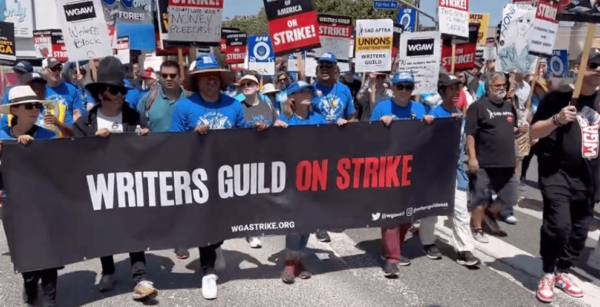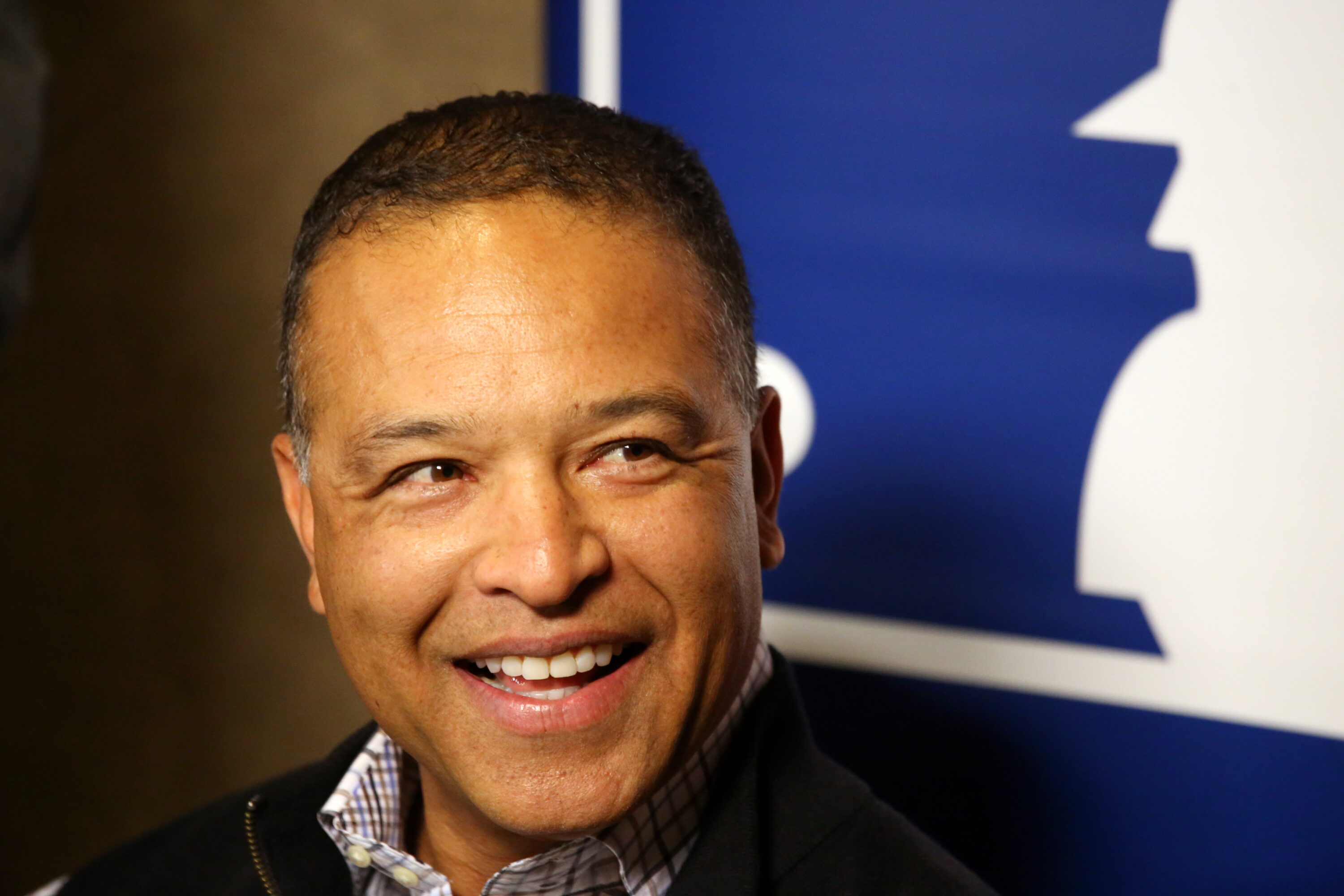With the Writers Guild of America strike now in its eighth week and no end in sight, thousands of union members and supporters marched Wednesday from Pan Pacific Park to the La Brea Tar Pits, where they held a boisterous rally looking to stir support for picketers.
Representatives from the WGA West, SAG-AFTRA, IATSE, the Directors Guild of America and the Teamsters, among others, gathered at the park around 10 a.m. and then took part in a massive march to the Great Lawn at the Tar Pits.
Once there, the participants were serenaded by musical performers, and they cheered as various union leaders took to the stage to demand a fair contract and a return to the negotiating table by Hollywood studios.
“I owe a great deal of my career to the incredible writers that I have been so fortunate to work with,” former DGA President Thomas Schlamme told the crowd. “Their talent has not only been a gift to me but to the millions and millions of people they have reached with their stories.”
He also called writers’ efforts “a cash cow to the companies that were lucky enough to produce their work.”
“It’s long past time that they give you the deal you so rightly deserve,” Schlamme said, adding that the studios need to “get off their asses and get back in the room with the WGA.”
Singer Aloe Blacc performed for the crowd, saying he wished he could do even more for the writers.
“But by standing with you right now, I hope is shows that we entertainers in the entertainment industry stand in solidarity with you,” he said.
Writer, producer and WGA member Liz Alper told the crowd it is unfair for studios to earn billions of dollars on the backs of underpaid workers.
“This tale of the employee working more to get paid less than ever before is the plight of every Hollywood worker now, despite the ever-increasing profits of our studios,” Alper said. “That is why all Hollywood unions are standing here today, shoulder-to-shoulder.”
Picketing continues to be an almost-daily feature outside all the major Los Angeles-area studios, but to diminishing media attention. Wednesday’s rally was an attempt to again shine a spotlight on the writers’ situation. The rally was the second multi-union event in which the WGA has participated since the walkout began, following a similar event in downtown LA on May 26.
The WGA’s roughly 20,000 members walked off the job May 2 — shuttering many scripted productions and also leaving thousands of other behind-the-scenes workers without a livelihood.
On June 4, the Alliance of Motion Picture and Television Producers, which represents the studios, reached a tentative three-year deal with the Directors Guild of America — and on June 7, AMPTP began contract talks with SAG-AFTRA, which represents actors.
But there has been no word of any talks between the WGA and AMPTP.
The WGA is pushing for improvements on a variety of fronts, notably for higher residual pay for streaming programs that have larger viewership, rather than the existing model that pays a standard rate regardless of a show’s success.
The union is also calling for industry standards on the number of writers assigned to each show, increases in foreign streaming residuals and regulations preventing the use of artificial intelligence technology to write or rewrite any literary material.
The AMPTP has pushed back against some of the WGA’s demands, particularly around its calls for mandatory staffing and employment guarantees on programs.
“These proposals require studios to staff a show with a certain number of writers who will be hired for a specified period of time that may not align with the creative process,” according to the alliance. “If writing needs to be done, writers are hired, but these proposals require the employment of writers whether they’re needed for the creative process or not. While the WGA has argued that the proposal is necessary to `preserv(e) the writers’ room,’ it is in reality a hiring quota that is incompatible with the creative nature of our industry.”
AMPTP has also pushed back against WGA demands around streaming residuals, saying the guild’s offer would increase rates by 200%.
The use of artificial intelligence has also emerged as a major topic.
The WGA says it wants a ban on the use of AI, and contends the AMPTP has refused to even negotiate the issue. The AMPTP said the issue raises “important creative and legal questions” and requires “a lot more discussion, which we’ve committed to doing.”
The agreement reached between AMPTP and the DGA includes a 12.5% salary increase over a three-year period, plus a “substantial” increase in residuals for streaming content — including a 76% increase in foreign residuals for the largest platforms and mutual confirmation that artificial intelligence is not a person and cannot replace the duties performed by DGA members.
That deal came after less than a month of negotiations, ahead of a June 30 expiration of the guild’s current contract.
The last WGA strike lasted from November 2007 until February 2008. Industry experts estimated that 100-day strike cost the local economy between $2 billion and $3 billion.







